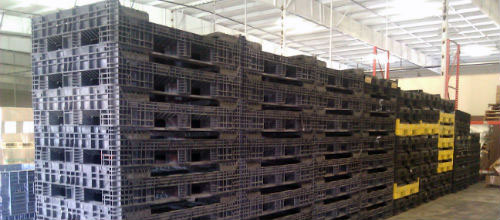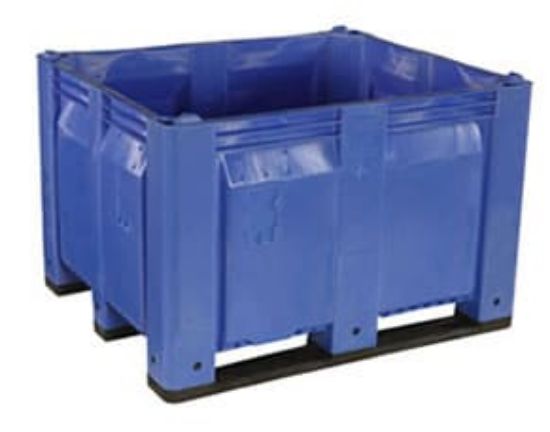The Ultimate Guide to Selecting the Right Mass Containers for Your Service Needs
Picking the proper bulk containers is important for any type of service that counts on efficient logistics. Numerous kinds of containers exist, each developed for certain materials and applications. Aspects such as size, product compatibility, and regulative standards play a considerable duty in this decision-making procedure. Recognizing these aspects can lead to boosted functional efficiency. Many organizations overlook crucial facets that could enhance their general performance and sustainability. What are these factors to consider?
Comprehending Various Sorts Of Mass Containers
Mass containers act as vital tools for businesses looking for reliable storage and transportation options. These containers can be found in numerous types, each designed to satisfy certain functional requirements. One usual kind is the intermediate bulk container (IBC), which is excellent for liquid and granulated materials, using an equilibrium of capacity and maneuverability. An additional prominent option is the mass bag, or FIBC, appropriate for dry, flowable products. These versatile containers are light-weight and can be easily transferred and saved. For heavier products, inflexible bulk containers are frequently utilized, offering durability and stability for risk-free handling. Additionally, there are specialized containers tailored for unsafe materials, ensuring conformity with security policies. Comprehending the unique characteristics of these mass container types allows companies to make informed decisions that optimize logistics and decrease costs. By selecting the right container, firms can improve their functional efficiency and simplify their supply chain procedures.
Secret Product Considerations for Mass Containers
When picking mass containers, it is necessary to consider the materials utilized in their building. Aspects such as toughness, chemical, and longevity compatibility play a vital duty in making certain the containers fulfill specific operational needs. Additionally, weight and transportability worries can influence both effectiveness and transport logistics.
Material Toughness and Stamina
Toughness and toughness are crucial consider selecting products for bulk containers, as they directly influence the container's capacity to withstand various ecological conditions and handling processes. Products such as high-density polyethylene (HDPE), polypropylene, and stainless-steel are typically preferred for their robust homes, supplying resistance to temperature, abrasion, and effect changes. The selection of product likewise influences the total life-span of the container; more powerful materials commonly result in much less frequent replacements, bring about set you back savings gradually. In addition, the weight of the material can impact delivery prices and simplicity of handling. Companies should consider their details functional atmospheres and the capacity for damage to assure peak toughness and stamina in their mass container choice.
Chemical Compatibility Variables
Comprehending chemical compatibility is important for selecting bulk containers, as the products utilized have to stand up to the particular compounds they will certainly hold. Different variables affect compatibility, consisting of the chemical nature of the materials, temperature, and period of storage. Corrosive chemicals may call for containers made from stainless steel or specialized plastics that withstand destruction. Additionally, responsive compounds can create warmth or gases, demanding vented or pressure-rated containers. The choice of container product, whether polycarbonate, polyethylene, or steel, ought to straighten with the chemical residential or commercial properties of the kept compounds to stop breaches or leaks. Eventually, a comprehensive examination of these compatibility variables guarantees risk-free handling and storage space, shielding both employees and the setting while keeping product integrity.
Weight and Mobility Concerns
Choosing bulk containers involves not just reviewing chemical compatibility however likewise considering weight and portability. Organizations should examine the simplicity of handling and transportation to enhance effectiveness. Light-weight products like high-density polyethylene (HDPE) or light weight aluminum can facilitate less complicated activity and decrease shipping prices. Conversely, larger containers might offer boosted sturdiness yet can impede mobility, especially in atmospheres needing frequent moving. In addition, the design of the container should enable practical training and stacking, making sure ergonomic security for workers. Companies need to likewise think about the infrastructure readily available for transport; for example, containers compatible with forklifts or pallet jacks can streamline operations. Ultimately, the appropriate balance in between weight and mobility directly influences operational effectiveness and price efficiency.
Sizing Your Bulk Containers for Optimal Effectiveness
When sizing mass containers, organizations must carefully examine the measurements called for to accommodate their certain products. Additionally, weight capacity is an important aspect that affects effectiveness and safety during transport and storage. Reliable sizing not only makes the most of space yet likewise optimizes operational workflows.
Establishing Container Capacities
Picking the appropriate dimensions for mass containers is crucial for maximizing effectiveness in storage and transport. Businesses have to analyze their details requirements, taking right into account aspects such as available room, the nature of the goods being saved, and the approaches of transport made use of. Precise dimensions assure that containers fit ideally in storehouses and vehicles, minimizing squandered room and minimizing taking care of time. Criterion dimensions can supply convenience, but custom dimensions might be required for one-of-a-kind demands or to accommodate particular products. In addition, it is very important to review piling capabilities and access, as these aspects influence general functional effectiveness. Ultimately, the ideal measurements lead to enhanced company and streamlined logistics, profiting the general efficiency of business.
Weight Ability Considerations
Comprehending weight capacity is essential for businesses intending to maximize their bulk container effectiveness. The weight capacity of a container directly impacts storage capabilities, transportation logistics, and general functional expenses. Choosing containers with the appropriate weight limitations guarantees that companies can securely store and carry their products without running the risk of damage or compliance concerns. Straining containers can lead to architectural failures, while underutilizing capability cause lost resources. It is very important for organizations to examine their product weights and think about any news type of governing needs when picking containers. In addition, factors such as the sort of material, intended usage, and ecological conditions need to likewise influence weight capability decisions. By assessing these elements, companies can boost effectiveness and guarantee a streamlined supply chain.
Regulatory Conformity and Safety And Security Requirements

Regulatory compliance and safety and security criteria play a vital role in the selection of mass containers for services. Organizations should guarantee that their containers satisfy numerous regulations set by local, nationwide, and worldwide authorities. These criteria typically refer to material security, architectural integrity, and correct labeling, which assist protect against mishaps and guarantee the secure transportation of products.
In addition, adherence to industry-specific standards, such as those from the Food and Medication Management (FDA) or the Occupational Security and Health And Wellness Management (OSHA), is important for business taking care of hazardous products or food products. Non-compliance can cause penalties, lawful concerns, or damages to a company's track record.
Businesses should also consider the container's compatibility with the materials being kept or moved to prevent contamination or chemical reactions (used collapsible containers). To sum up, comprehending and implementing regulatory compliance and security requirements is vital for the reliable and liable use bulk containers
Sustainability Options for Eco-Friendly Mass Containers

Companies are also discovering options made from recycled products, which not only preserve resources yet likewise support the recycling market. Additionally, innovations in style permit for lighter containers that call for less energy to transportation, better boosting sustainability. By incorporating these green mass container options, organizations can show their commitment to ecological stewardship while meeting consumer need for sustainable methods. This shift not just helps the planet however can likewise enhance brand track record and consumer loyalty.
Cost-Effectiveness and Budgeting for Mass Containers
While lots of organizations concentrate on sustainability, cost-effectiveness continues to be an essential factor when picking mass containers. Organizations should assess the first purchase cost, in addition to lasting functional prices, to assure financial stability. Elements such as maintenance, resilience, and reusability play a considerable role in determining overall costs.
Buying top quality containers might produce higher upfront costs yet can cause cost savings via lowered substitute go to the website prices and lowered waste. Additionally, organizations need to take into consideration transport expenses and storage space performance, as these can influence the overall spending plan.

Regularly Asked Concerns
How Do I Determine the Right Container for Hazardous Products?
To determine the best container for harmful products, one have to review compatibility with the compound, take into consideration the container's material, check for regulatory conformity, and examine ability and safety features to ensure appropriate handling and storage.
Can Mass Containers Be Custom-made for Details Products?
Yes, bulk containers can be tailored for certain items. used plastic containers. Various attributes, such as material, layout, and size, can be tailored to fulfill unique demands, guaranteeing optimal safety and security site here and performance for transporting and saving various goods
What Is the Typical Life Expectancy of Different Mass Container Kind?
The ordinary lifespan of mass container types differs; plastic containers last 5-10 years, metal containers 10-20 years, and wood containers commonly last 3-7 years, relying on usage, upkeep, and ecological problems.
How Should I Clean and Maintain Bulk Containers?
To clean and maintain bulk containers, one should on a regular basis check for damage, remove deposit, clean with appropriate cleaning agents, wash extensively, and warranty appropriate drying prior to storage. Complying with manufacturer guidelines improves longevity and safety during usage.
Are There Rental Options for Bulk Containers Available?
Yes, countless firms use rental alternatives for mass containers, offering flexibility for companies. These services can suit different needs, allowing business to take care of supply efficiently without the dedication of acquiring containers outright.
Sturdiness and toughness are essential variables in picking materials for mass containers, as they directly affect the container's capability to withstand different environmental problems and managing processes. Understanding chemical compatibility is important for picking bulk containers, as the materials made use of have to resist the certain materials they will certainly hold. Understanding weight ability is essential for businesses intending to maximize their bulk container performance. Regulatory compliance and safety standards play an essential function in the option of mass containers for companies. While numerous companies concentrate on sustainability, cost-effectiveness remains an essential variable when selecting mass containers.